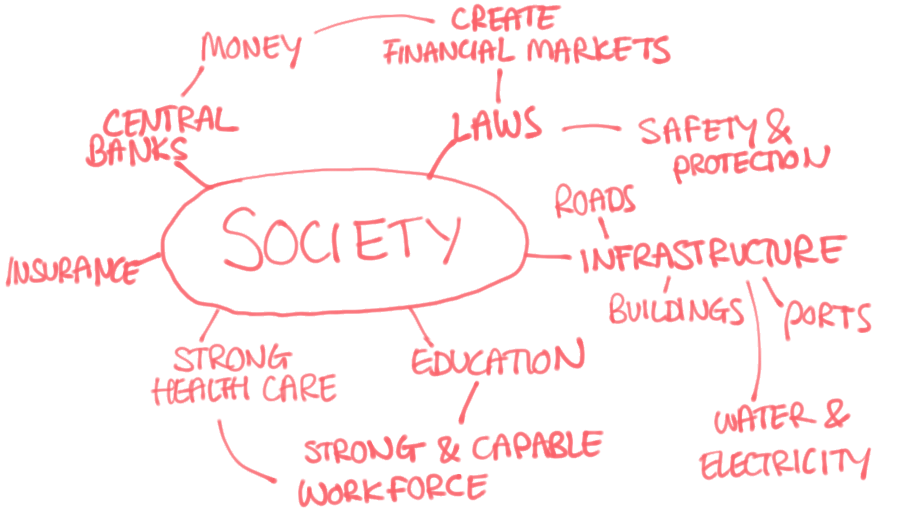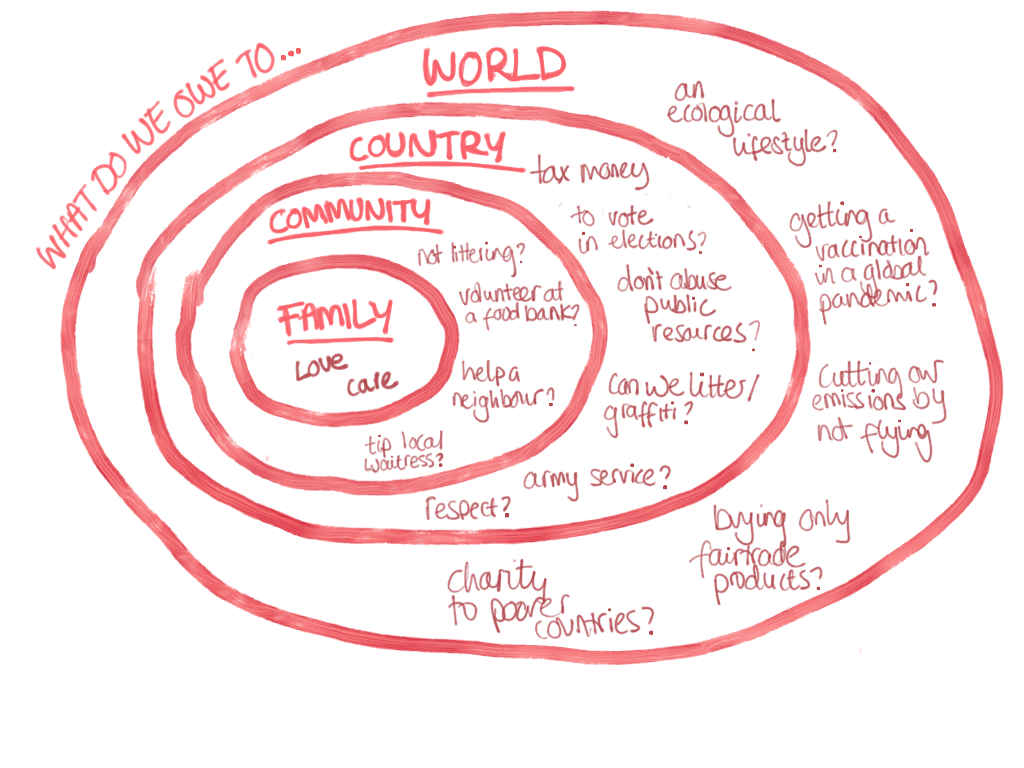What is a society? We live in a complex human web of systems that make up our societies. From the moment we’re born we interact with our society. In the early years we take a lot from it. As adults, we contribute to it, and in old age we begin taking again.
It can be hard to conceptualise since we take so many of societies offerings for granted. When we work and earn and employ people, we will be using the skills and expertise that are available to us. Societies creates laws that enable financial markets which we can trade with. The infrastructure; roads, buildings, highways and ports are all created for collective use by our societies. Education is a collective pooling of resources to target all young people in the society. Healthcare too. Our societies create laws to keep people safe and courts to grant people rights and reassurance.

The society we grow into is our ‘lot‘ in life. ‘Self-made’ is a phrase we use to mean ‘personal achievement’- people usually use it when they talk about rising above their family or ‘rising up ‘ relative to the community they’re born into. But there are much bigger forces at play that you necessarily interact with as a ‘self-made’ person.
What is our responsibility to society?
We’re interacting with society – how do we feel about that? What do we expect from it and what do we feel is right to owe to it. Should people who use them more owe them more?
Different cultures have different views on this and as such countries have very different expectations of the relationship between individuals and society. There’s a book, ‘What we owe to eachother‘ by Minouche Shafik I read which presented a lot of these concepts.
In Asian societies, the collective interest of all people is usually valued before the interest of individuals. The USA sits at the complete other end of the scale as the culture dictated individual freedom above the collective interest. European countries tend to sit somewhere in the middle, between thee two.
How we feel about our relationship with society also related to the relationships we want and expect from our families or communities. We have an inbuilt understanding that both in family and community we will always have some level of give and take. Even if it’s between generations (such as parents giving to their children but then receiving care from their children once they’re older). These are often valued more highly, at least in our culture, than the relationships we have with society. Usually because it’s a direct benefit we can see.
The relationship with society is much harder to grasp. In the same book I read about this paper that says 4 in 5 people in the USA, EUROPE, CHINA and INDIA thing their societal system in not working for them. That’s quite strange- if society is meant to work for the collective- why do the majority feel it isn’t working for them? There might be another post for that
How do we view our personal responsibilities? Who are we responsible to?
I’ve sketched out below how we might view our responsibilities with the people around us. These are circles showing each step of responsibility to the wider and wider world around us. Most people feel they owe all responsibility to the family and receive the same. What do we owe to our community? Not to litter/ to respect others property? To watch a friends children if they have to go out? To volunteer at a food bank? or to foster relationships and tip waitresses at the local café?

One step further out…
What do we owe our countries? We owe our tax money. We owe not to waste public resources. How do we feel about public property? Can we litter? Can we graffiti?. It depends what we feel we get from ‘the country’. Often, all things combined, it’s a lot but it’s not valued in the same way.
One step further out still…
What do we owe to the world? To citizens of the world in other societies: do we owe an ecological lifestyle? Do we owe cutting our emissions from personal flying? So we owe getting a vaccination or not travelling under travel bans in a global pandemic? Do we owe only buying fairtrade products? Do we owe charity to countries less fortunate then ours.
As the circle expands the responsibility we feel becomes ‘washier’ but the amount we gain increases. Not on a small daily level but on a large level for sure. For examples; a neighbour coming over to mind your dog while you have to rush to visit a relative in hospital feels more helpful in the moment. But the air that we breathe and the water that we drink (product of environment, brought about by societies who clean the water and create laws to keep air clean) are bigger overall.
This isn’t a rosy view of societies and world and relationships and responsibility. But it feels rosy because in the media there is so much anger and frustration at societies. People feel extremely hard done by; as i touched on above; they feel like they’re not gaining anything from society- like it’s only take from them. There is a lot of frustration. I have another post about this here.
Thank you for reading this post: what is a society?
Thanks for reading! I really really appreciate everyone who is reading this right here. Please get in touch and let me know if you are! This is the first post in a new series on society and our individual relationships with societal systems; education, healthcare, environment and probably more with time.

